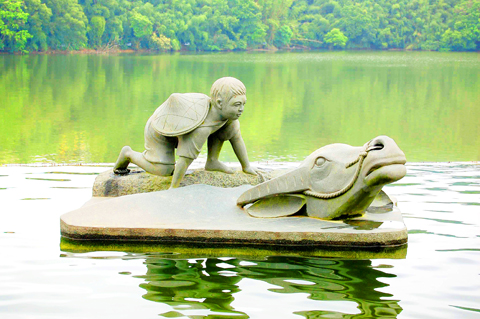The Taipei International Medical Assistance Team (Taipei IMAT) will leave for Mongolia to provide free health checks and other medical services to herders, the Taipei City Hospital said yesterday.
Taiwanese pharmaceutical companies will also donate 100 blood sugar test kits and different types of drugs to Mongolia, the hospital said.
Ho Hsiao-feng, chief of the International Cooperation Section of the Taipei City Hospital, who is also a member of Taipei IMAT, said the team would mainly provide services in the suburbs of the Mongolian capital, Ulan Bator, and in the Khovd Province located in western Mongolia where the majority of the herders live.

PHOTO: FU CHAO-PIAO, TAIPEI TIMES
“In Mongolia, the most prevalent illnesses are chronic diseases, such as high blood pressure and hepatitis,” she said.
The local health department has attributed these chronic diseases to dietary habits and the sharing of syringe needles, she said.
Chen Jun-chiu, the Taipei City Hospital’s deputy superintendent, said that about 54 percent of Mongolian herders suffer from high blood pressure, due to heavy drinking and the high sodium and fat content of their food.
Moreover, because of the long hours on horseback, herders often suffer from knee problems and sciatic nerve pain, the hospital said.
In developed countries, these problems usually only occur among the elderly, the hospital said, adding that due to a lack of medical resources and economic support, many herders cannot afford surgery or drugs.
“Mongolia is like Taiwan three or four decades ago, when the medical network and public health system were inadequate,” Ho said.
Taipei IMAT, consisting of 14 medical professionals and care workers, is slated to leave on a two-week trip to Ulan Bator on Monday, Ho said, adding that the group has been providing volunteer services in Mongolia every year since 2003.
It has also done volunteer medical work in southern India, Sao Tome and Principe and in some remote provinces of China, Ho said.

Chinese President Xi Jinping (習近平) is unlikely to attempt an invasion of Taiwan during US president-elect Donald Trump’s time in office, Taiwanese and foreign academics said on Friday. Trump is set to begin his second term early next year. Xi’s ambition to establish China as a “true world power” has intensified over the years, but he would not initiate an invasion of Taiwan “in the near future,” as his top priority is to maintain the regime and his power, not unification, Tokyo Woman’s Christian University distinguished visiting professor and contemporary Chinese politics expert Akio Takahara said. Takahara made the comment at a

Upon its completion next year, the new Tamkang Bridge (淡江大橋) in New Taipei City is to be an important landmark in Taiwan, alongside Taipei 101, Minister of Transportation and Communications Chen Shi-kai (陳世凱) said today. The bridge is scheduled to be completed in December next year and open to the public in the first half of 2026, connecting New Taipei City’s Tamsui (淡水) and Bali (八里) districts. It is an asymmetric single-tower suspension bridge, nearly 70 stories tall, designed by world-famous architect Zaha Hadid. The bridge aims to alleviate traffic in Tamsui and on the Guandu Bridge (關渡大橋), in addition to increasing the

EXERCISES: A 2022 article by a Chinese intelligence expert identified at least six People’s Liberation Army assault boats hidden inside the Hong Kong-flagged ship A Hong Kong-flagged cargo ship that had been docked at Taichung Port and which previously took part in Chinese military exercises departed from the port on Saturday, the Taiwan International Ports Corp’s Taichung branch said yesterday. The statement came in response to a post on the social media platform X by Taiwan-based journalist Chris Horton that said the ship, the SCSC Fortune, had been docked at the port since Tuesday and questioned whether Taiwan has any rules regarding foreign civilian vessels that have participated in People’s Liberation Army (PLA) exercises. Horton referenced a 2022 article by Chinese intelligence expert Rod Lee that

PROBLEMATIC: Popular hotpot restaurant chains were among the list of restaurants that failed the inspection and have been ordered to remove bad ingredients The Taipei Department of Health’s latest inspection of hotpot ingredients in hotpot restaurants resulted in a 16.7 percent failure rate. Eight vegetables had excessive pesticide residue and two other items had aflatoxin and excessive preservatives. As the weather is getting colder, more people eat at hotpot restaurants so a random inspection of ingredients was conducted in October to ensure food safety, the department said. Food and Drug Division Director Lin Kuan-chen (林冠蓁) said 60 different ingredients were tested: 15 high-risk vegetables, 15 processed food items, 10 soy-based food items, five meat items, five lamb items, five seafood items and five peanut powder